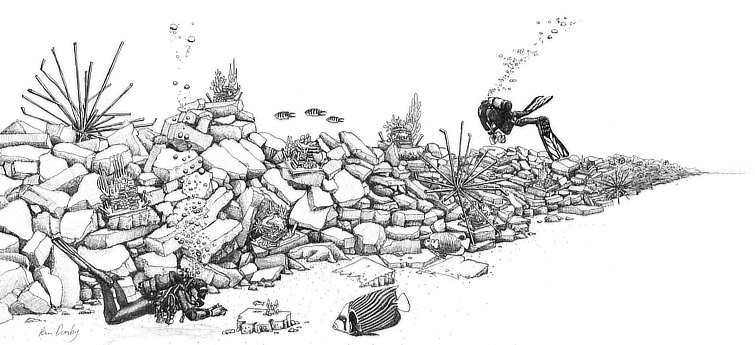
Dr. Aaron Hartmann, a Harvard coral ecologist who created the Arks concept alongside Dr. Forest Rohwer, was approached by Dr. Christopher Golden, an epidemiologist and ecologist in the Harvard Nutrition Department. Chris looks for synergies in ways to improve human and environmental health. He focuses much of his effort on the African island of Madagascar, one of the most impoverished and malnourished countries in the world. Chris was intrigued by Aaron’s new approaches for restoring coral reefs and thought they could be particularly useful in the southwest of Madagascar. There, the climate is arid and agriculture is scarce. People are dependent on marine resources out of necessity and culture. Fish are the primary source of protein, as they are throughout most of the tropics. Meanwhile, the human population is growing, causing greater strain on dwindling marine resources and exacerbating malnutrition in the local community.
Chris and Aaron teamed up with Dr. Gildas Todinanahary, a professor at IHSM, the country’s only marine science institute, and an NGO Director, Emma Gibbons, of Reef Doctor. Emma and Gildas have been working to restore reefs in southwest Madagascar for many years, primarily by building artificial reefs made of locally sourced boulders. They have found that their artificial reefs recruit fish and invertebrates, but two important questions remain: Do the artificial reefs produce enough fish (as food) to improve the health of local peoples? And are artificial reefs increasing the abundance of fish or are they merely aggregating existing fish and making it easier to catch them, amplifying overfishing?
Like Arks, these artificial reefs build the structure but not the biology. Aaron thought of ARMS as a way to speed up the reef-building process on these artificial reefs. Aaron assembled a team that secured funding from the Belmont Forum, a consortium of national funding agencies from countries across the world, including the US National Science Foundation. Their goal is to demonstrate that artificial reefs seeded with ARMS are an effective tool to grow fish and create healthy reef ecosystems in Madagascar. The team includes ecologists, fisheries scientists, and nutritionists, who together plan to study the impacts of this technology across ecological health, fisheries production, and human health outcomes to address the two pressing questions above.
The team will use modified Arks structures and other design elements (e.g., harmful fishing practice deterrents) in 6-8 large artificial reefs. The collaboration with Reef Doctor is opening up avenues for engagement with local groups, particularly artisanal fishers, who will be fully integrated into the project’s implementation.